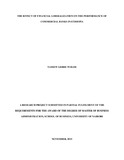| dc.description.abstract | In the present day globalized market, it is believed that a good financial system consisting of a competitive market and well-built financial institutions is one of the vital bulwarks of sustainable economic development. However, this will be achieved in a country if there is intensified financial integration of the domestic financial market with world markets and rapid growth in global trade in goods and financial services. Obviously, the pace and scope of the integration process varies across countries and has been found to be hastened by financial liberalization. Integration of financial services and internationalization of the banking sector has made the entry of foreign banks much more important than at any time before. During the last decades, financial
liberalization accelerated the pace of globalization of financial markets has also been found to enhance the performance of commercial bank. Thus, liberalization of financial sector creates a financial environment suitable to enhance positive returns on money capital as well as an appropriate institutional framework which eventually leads to an increase in deposits and investment leading to financial performance of banks. This study sought to investigate the effect of financial liberalization on the performance of commercial banks in Ethiopia. It was based on Financial Liberalization Theory and Financial Intermediation Theory. This study employed descriptive research design. The population of interest in this study was all the commercial banks in Ethiopia that have operated between 2010 and 2014. Since the number of the respondents is limited, then the study was a census survey. The study was an event research where data was
collected from annual reports submitted to the National Bank of Ethiopia. Multiple regression analysis was applied to the data to examine the effect of the various aspects of liberalization on the performance of the commercial banks in Ethiopia. The F- test was used to determine the significance of the regression while the coefficient of determination, R2, will be used to determine how much variation in Y is explained by X. This was done at 95% confidence level and correlation analysis was carried out to find the direction of the relationship between ROA and the independent variables. The Statistical Package for Social Sciences (SPSS) was used to analyze the data. The study found that there was positive relationship between return on assets and all the predictor variables (market share of the bank, concentration ration, branch network, loan asset ratio, equity to asset ratio, and age of the bank).The study concluded that the liberalization has brought a significant change in the bank with regard to credit quality
performance. Thus, the bank has the greater capacity to sustain the assets losses in the post reform period than before. The study recommended that more investments should be done through establishing more branch networks across the country which is associated positively with their financial performance and managers should also develop new services by using new technologies, such as the online trading. | en_US |

